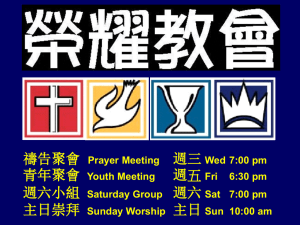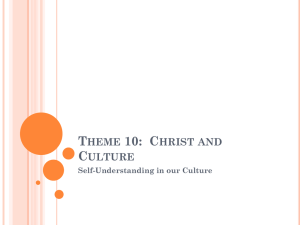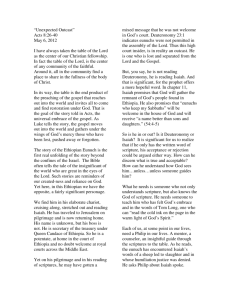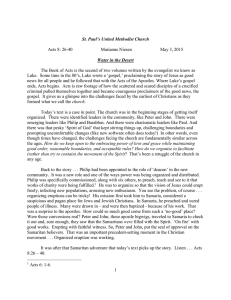(Chris Luyt) – Sermon Notes 27 September 2015
advertisement
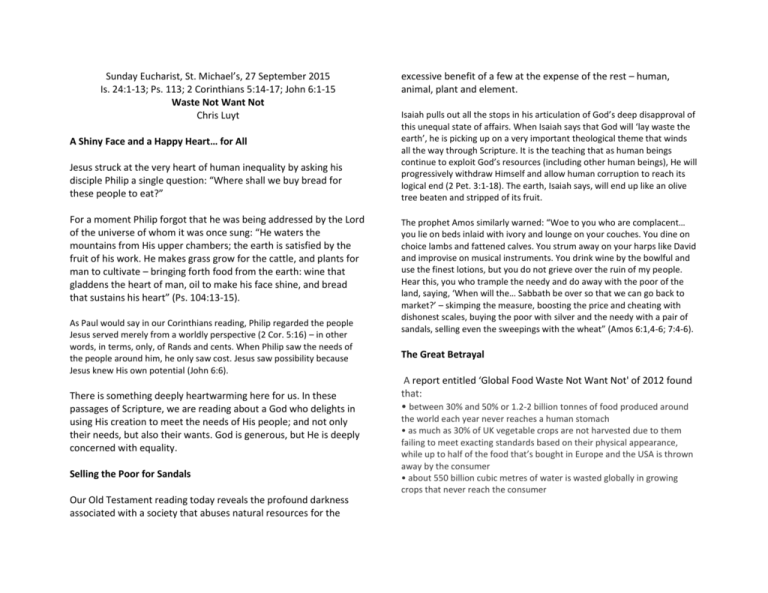
Sunday Eucharist, St. Michael’s, 27 September 2015 Is. 24:1-13; Ps. 113; 2 Corinthians 5:14-17; John 6:1-15 Waste Not Want Not Chris Luyt A Shiny Face and a Happy Heart… for All Jesus struck at the very heart of human inequality by asking his disciple Philip a single question: “Where shall we buy bread for these people to eat?” For a moment Philip forgot that he was being addressed by the Lord of the universe of whom it was once sung: “He waters the mountains from His upper chambers; the earth is satisfied by the fruit of his work. He makes grass grow for the cattle, and plants for man to cultivate – bringing forth food from the earth: wine that gladdens the heart of man, oil to make his face shine, and bread that sustains his heart” (Ps. 104:13-15). As Paul would say in our Corinthians reading, Philip regarded the people Jesus served merely from a worldly perspective (2 Cor. 5:16) – in other words, in terms, only, of Rands and cents. When Philip saw the needs of the people around him, he only saw cost. Jesus saw possibility because Jesus knew His own potential (John 6:6). There is something deeply heartwarming here for us. In these passages of Scripture, we are reading about a God who delights in using His creation to meet the needs of His people; and not only their needs, but also their wants. God is generous, but He is deeply concerned with equality. Selling the Poor for Sandals Our Old Testament reading today reveals the profound darkness associated with a society that abuses natural resources for the excessive benefit of a few at the expense of the rest – human, animal, plant and element. Isaiah pulls out all the stops in his articulation of God’s deep disapproval of this unequal state of affairs. When Isaiah says that God will ‘lay waste the earth’, he is picking up on a very important theological theme that winds all the way through Scripture. It is the teaching that as human beings continue to exploit God’s resources (including other human beings), He will progressively withdraw Himself and allow human corruption to reach its logical end (2 Pet. 3:1-18). The earth, Isaiah says, will end up like an olive tree beaten and stripped of its fruit. The prophet Amos similarly warned: “Woe to you who are complacent… you lie on beds inlaid with ivory and lounge on your couches. You dine on choice lambs and fattened calves. You strum away on your harps like David and improvise on musical instruments. You drink wine by the bowlful and use the finest lotions, but you do not grieve over the ruin of my people. Hear this, you who trample the needy and do away with the poor of the land, saying, ‘When will the… Sabbath be over so that we can go back to market?’ – skimping the measure, boosting the price and cheating with dishonest scales, buying the poor with silver and the needy with a pair of sandals, selling even the sweepings with the wheat” (Amos 6:1,4-6; 7:4-6). The Great Betrayal A report entitled ‘Global Food Waste Not Want Not' of 2012 found that: • between 30% and 50% or 1.2-2 billion tonnes of food produced around the world each year never reaches a human stomach • as much as 30% of UK vegetable crops are not harvested due to them failing to meet exacting standards based on their physical appearance, while up to half of the food that’s bought in Europe and the USA is thrown away by the consumer • about 550 billion cubic metres of water is wasted globally in growing crops that never reach the consumer If we dig a little deeper as South Africans, we may find that we ourselves are not that far off from this complacency. The second important question to reflect on this week is: 2. What am I doing with the waste that I generate? A Season for Reflection It is with all of this in mind that our liturgy calls us to deep reflection during this Season of Creation. This week in particular is the week dedicated to the theme of excessive living and wastage. In our first week we considered the importance of being good stewards. Both of these themes are directly related. We need to ask ourselves two very important questions: 1. What am I doing with the resources that God has given me? Paul, in our Corinthians passage, reminds us that Jesus, being in fact God, put His own needs aside in order to reach out and benefit others in need. Paul reminds us that in being true Christians, we have dedicated ourselves to a life where we imitate Jesus selflessness – “For Christ’s love compels us, because we are convinced that one died for all, and therefore all died” (2 Cor. 5:14). What does Paul mean when he says that (we) ‘all die’? The answer is in the very next verse: “And he died for all, that those who live (in the truest possible sense) should no longer live for themselves but for him who died for them and was raised again” (2 Cor. 5:15). We live for Christ as we live for others rather than ourselves. If this is true of us, we will not horde resources or indulge in excess when so many around us are struggling just to survive because of the fundamental inequality of the world that we live in. Our psalm assures us that God is the God who “stoops down to look on the heavens and the earth [and] raises the poor from the dust and lifts up the needy from the ash heap” (Ps. 113:6-7). As followers of Christ we are unmistakably called to a life of simplicity and service. The issue is whether we have the courage to fulfil that call. The first question challenges us to produce as little waste as possible because we are not hording everything for ourselves in excess. The second question challenges us in regard to our management of the waste that we do produce. Here are a few practical ways in which we are constantly being challenged to conserve resources and be responsible with our waste: - - - Be conscious of the effect that the processing and packaging of your consumables will have on the environment and, where possible, opt for unpackaged products or products packaged in biodegradable or recycled packaging Don’t be too picky about the look of the fruit and vegetables you buy. Buying for look alone encourages wasteful food production practices. Buy more simply and give the money you save to other who need it more than you do. Where possible, buy consumables from reputable vendors who are working for themselves to make a living for their families Share excess food and resources with others instead of allowing them to rot or expire in your cupboards Reuse and recycle potential waste products Compost all biodegradable waste Conserve water by harvesting rain water; maintaining your water system, and by using grey-water to water your garden Conserve energy by switching to more energy efficient household systems Borrow and lend resources that you don’t actually need to own “I brought you into a fertile land to eat its fruit and rich produce. But you came and defiled my land and made my inheritance detestable.” Jer. 2:7


